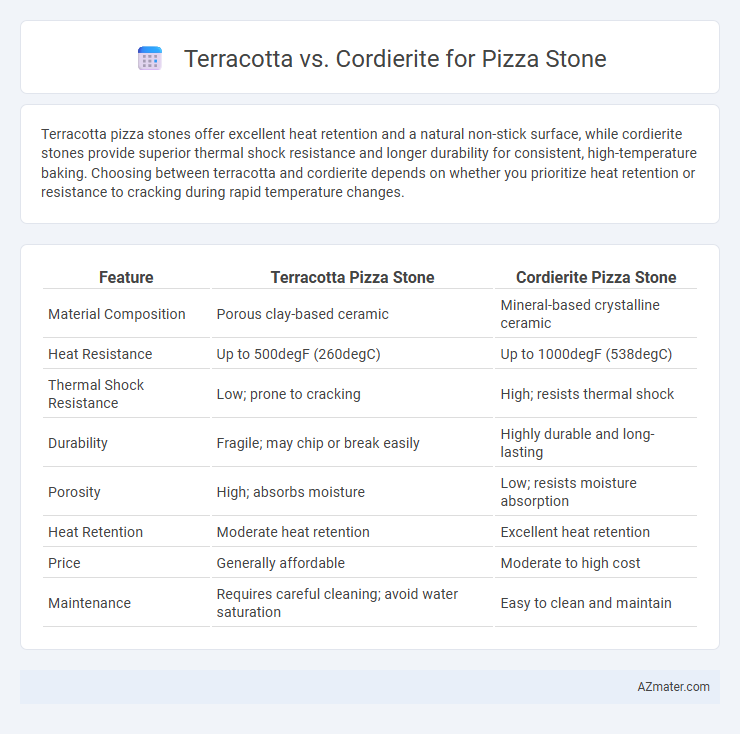Terracotta pizza stones offer excellent heat retention and a natural non-stick surface, while cordierite stones provide superior thermal shock resistance and longer durability for consistent, high-temperature baking. Choosing between terracotta and cordierite depends on whether you prioritize heat retention or resistance to cracking during rapid temperature changes.
Table of Comparison
| Feature | Terracotta Pizza Stone | Cordierite Pizza Stone |
|---|---|---|
| Material Composition | Porous clay-based ceramic | Mineral-based crystalline ceramic |
| Heat Resistance | Up to 500degF (260degC) | Up to 1000degF (538degC) |
| Thermal Shock Resistance | Low; prone to cracking | High; resists thermal shock |
| Durability | Fragile; may chip or break easily | Highly durable and long-lasting |
| Porosity | High; absorbs moisture | Low; resists moisture absorption |
| Heat Retention | Moderate heat retention | Excellent heat retention |
| Price | Generally affordable | Moderate to high cost |
| Maintenance | Requires careful cleaning; avoid water saturation | Easy to clean and maintain |
Introduction: Choosing the Right Pizza Stone Material
Terracotta pizza stones offer excellent heat retention and natural non-stick properties, making them ideal for achieving crispy crusts with even cooking. Cordierite, known for its superior thermal shock resistance and durability, withstands high temperatures without cracking, providing long-lasting performance for frequent pizza baking. Selecting the right pizza stone material depends on balancing heat conductivity, durability, and maintenance preferences to enhance overall baking results.
What is Terracotta?
Terracotta is a natural clay-based ceramic material known for its porous texture and excellent heat retention, making it ideal for pizza stones. This porous quality allows Terracotta stones to absorb moisture from the dough, resulting in a crispy crust. Unlike Cordierite, Terracotta heats evenly but is more prone to cracking under rapid temperature changes, requiring careful handling during use.
What is Cordierite?
Cordierite is a highly durable mineral commonly used in pizza stones due to its exceptional thermal shock resistance and ability to withstand high temperatures without cracking. Unlike terracotta, cordierite retains heat more evenly, ensuring a crisp, evenly cooked crust while minimizing the risk of breakage during rapid temperature changes. Its superior strength and longevity make cordierite a preferred choice for both amateur and professional pizza makers seeking consistent baking performance.
Heat Retention and Distribution: Terracotta vs Cordierite
Cordierite pizza stones exhibit superior heat retention and even heat distribution compared to terracotta, maintaining consistent cooking temperatures and reducing hot spots. Terracotta absorbs heat quickly but cools faster, causing temperature fluctuations that can affect pizza crust texture. Cordierite's dense composition allows for prolonged heat holding, making it ideal for achieving crispy, evenly cooked pizza bases.
Durability and Lifespan Comparison
Cordierite pizza stones offer superior durability compared to terracotta, boasting high thermal shock resistance that reduces the risk of cracking during rapid temperature changes. Terracotta stones are more porous and prone to chipping or cracking over time, resulting in a shorter lifespan when exposed to frequent heating and cooling cycles. The longevity of cordierite stones can extend several years with proper care, while terracotta typically requires more frequent replacement due to its fragile nature.
Heat-Up Time and Temperature Tolerance
Terracotta pizza stones typically have a slower heat-up time due to their dense, porous structure, which absorbs heat gradually and distributes it evenly, but they can crack under rapid temperature changes. Cordierite stones heat up faster and tolerate higher temperatures up to 1400degF (760degC) without cracking, making them ideal for achieving crispy crusts in high-heat pizza ovens. Cordierite's superior thermal shock resistance ensures longer durability and consistent cooking performance compared to terracotta, which is more prone to thermal stress damage.
Porosity and Moisture Absorption
Terracotta pizza stones typically exhibit higher porosity, allowing them to absorb more moisture during baking, which helps create a crispier crust. In contrast, cordierite stones have lower porosity and moisture absorption, providing better thermal shock resistance and durability. Choosing between terracotta and cordierite depends on whether moisture absorption for crust texture or stone longevity is prioritized.
Ease of Cleaning and Maintenance
Terracotta pizza stones require careful cleaning by hand-washing with warm water and avoiding soap to preserve porous material and prevent cracking. Cordierite pizza stones are more durable and less porous, making them easier to clean with simple rinsing and less susceptible to stains or odor retention. Regular maintenance of both materials involves avoiding sudden temperature changes to prolong their lifespan and maintain optimal heat retention.
Price and Availability
Terracotta pizza stones are generally more affordable and widely available in most home goods or kitchenware stores, making them a budget-friendly option for casual bakers. Cordierite stones tend to be pricier due to their enhanced durability and heat retention, often found through specialty cooking retailers or online marketplaces. Availability of cordierite pizza stones might be limited compared to terracotta, but their longer lifespan can justify the higher initial price for frequent pizza makers.
Which Pizza Stone Material is Best for You?
Terracotta pizza stones offer excellent heat retention and evenly distribute heat, making them ideal for achieving a crisp crust, but they tend to be more fragile and prone to cracking under thermal shock. Cordierite stones provide superior durability, resist thermal shock better, and maintain consistent cooking temperatures, which is beneficial for frequent use and high-temperature baking. Choosing between terracotta and cordierite depends on your baking frequency, temperature preferences, and willingness to handle delicate materials versus investing in long-lasting durability.

Infographic: Terracotta vs Cordierite for Pizza Stone
 azmater.com
azmater.com